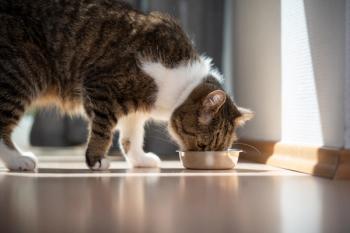
Generic furosemide tablets for cats and dogs is launched
Generic furosemide is used to help manage heart failure.
ZyVet Animal Health has launched an FDA-approved generic form of furosemide tablets, used for managing congestive heart failure and chronic fluid retention in cats and dogs. The medication is the most commonly used veterinary diuretic for decreasing edema and pulmonary congestion caused by cardiac, renal, or systemic conditions.
In a news release announcing the drug’s launch, ZyVet said its formulation gives veterinarians a cost-effective option for long-term therapy “without compromising dosing flexibility or product availability.”1
“We are happy to participate in the animal health segment and launch the first approved generic of Furosemide in the US,” Punit Patel, president and CEO of Zydus Americas, the parent company of ZyVet, said in a company news release.1 “Managing chronic conditions in pets is a long journey, and consistency in care makes all the difference. At ZyVet, we believe in ensuring that veterinarians and pet owners have reliable, affordable options they can count on, and this launch is another step toward making quality drugs accessible to all.”
According to ZyVet, the medication is available in more than one strength for patient-specific dosing.
Heart failure in cats and dogs
Congestive heart failure occurs when the heart cannot pump blood effectively, leading to fluid buildup that may leak from blood vessels. In cats and dogs, left-sided heart failure can cause fluid pulmonary edema, while right-sided heart failure leads to pleural effusion or ascites.2
Common signs of heart failure in felines are difficulty breathing; a large, round abdomen due to fluid buildup in the abdomen; exercise intolerance; lethargy; hiding; weight loss; and poor appetite. In felines, coughing is not a common symptom of the disease.
Arterial thromboembolism, the formation of blood clots that travel through the bloodstream, can occur in cats with advanced heart disease. These clots most often lodge where the aorta divides into the femoral arteries, which supply the hind limbs. This blockage, called a saddle thrombus, is very painful and can cause sudden loss of function in one or both back legs, leading to paralysis in the limbs and the limb feeling cold.2 Although less common, blood clots may also lodge in the front limbs, causing the same symptoms as a saddle thrombus but on the affected front limb.
Unlike in cats, the most common sign of congestive heart failure in dogs is a persistent cough alongside difficulty breathing. Coughing may occur when resting or sleeping. Excessive panting, getting tired more easily, loss of appetite, a swollen belly, and pale or bluish gums are also signs. Dogs will heart failure may also experience generalized weight loss and muscle wasting.3
References
- ZyVet launches affordable Furosemide tablets to support long-term heart care trusted diuretic for dogs and cats now available in a generic form. News release. ZyVet Animal Health. September 15, 2025.
- Barnes C. Congestive heart failure in cats. VCA Animal Hospitals. Accessed September 19, 2025. https://vcahospitals.com/know-your-pet/congestive-heart-failure-in-cats
- Congestive Heart Failure in Dogs. VCA Animal Hospitals. Accessed September 19, 2025. https://vcahospitals.com/know-your-pet/congestive-heart-failure-in-dogs
Newsletter
From exam room tips to practice management insights, get trusted veterinary news delivered straight to your inbox—subscribe to dvm360.






